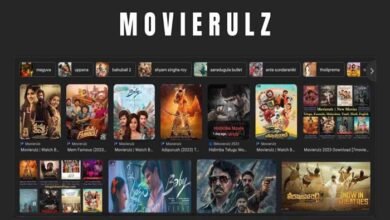Movies have been a cornerstone of global culture for over a century, captivating audiences with their ability to tell stories, evoke emotions and reflect societal values. The world of movies is vast and diverse, encompassing a wide range of genres, styles, and narratives that cater to every imaginable taste. From the silent films of the early 20th century to the cutting-edge CGI masterpieces of today, movies have continually evolved, pushing the boundaries of creativity and technology. This guide delves into the multifaceted universe of movies, exploring their history, genres, influential figures, and the trends shaping the future of cinema.
The Evolution of Movies Through the Decades
The history of movies is a fascinating journey of innovation and transformation. Beginning with silent films in the late 1800s, the introduction of sound in the 1920s revolutionized the industry, giving birth to “talkies.” The Golden Age of Hollywood in the 1930s to 1950s saw the rise of iconic studios and legendary actors, shaping the foundational elements of modern cinema. The 1960s and 1970s introduced more experimental and diverse storytelling, while the advent of digital technology in the late 20th and early 21st centuries brought about significant changes in production and distribution. Today, movies are not only a major form of entertainment but also a powerful medium for cultural expression and technological advancement.
Exploring Different Movie Genres
Movies come in a plethora of genres, each offering unique experiences and storytelling techniques. Understanding these genres can enhance your appreciation of cinema and help you discover new favorites.
Action
Action movies are characterized by high-energy sequences, including fights, chases, and explosions. They often feature heroes overcoming significant obstacles, providing thrilling entertainment.
Drama
Drama movies focus on emotional and relational development, portraying realistic characters and scenarios that resonate deeply with audiences.
Comedy
Comedy movies aim to amuse and entertain through humor, satire, and witty dialogues, offering a light-hearted escape from everyday life.
Horror
Horror movies are designed to elicit fear, suspense, and shock, often featuring supernatural elements, monsters, or psychological thrillers.
Science Fiction
Science fiction movies explore futuristic concepts, advanced technology, and speculative ideas, often addressing philosophical and ethical questions.
Romance
Romance movies center around love stories, highlighting the complexities and beauty of romantic relationships.
Documentary
Documentary movies present factual narratives, shedding light on real events, people, and issues, often aiming to inform or inspire.
Fantasy
Fantasy movies transport viewers to magical worlds with mythical creatures, epic quests, and imaginative settings.
Animation
Animation movies utilize drawn or computer-generated imagery to create visually stunning and often family-friendly stories.
Thriller
Thriller movies build tension and excitement through suspenseful plots, unexpected twists, and intense pacing.
The Art of Filmmaking: From Script to Screen
Creating a movie is a complex and collaborative process that involves several key stages:
Scriptwriting
The journey of a movie begins with the script, where the story, dialogues, and characters are crafted, laying the foundation for the entire production.
Pre-Production
During pre-production, planning takes place, including casting, location scouting, budgeting, and scheduling. This phase ensures that all elements are in place before filming begins.
Production
Production is the actual filming phase, where directors, actors, and crew work together to capture the scenes as envisioned in the script.
Post-Production
Post-production involves editing, adding special effects, sound design, and scoring, and refining the raw footage into the final movie.
Distribution
Once completed, the movie is distributed to theaters, streaming platforms, and other media outlets, making it accessible to audiences worldwide.
Influential Directors Who Shaped Movies
Several visionary directors have left an indelible mark on the world of movies through their innovative techniques and compelling storytelling.
Alfred Hitchcock
Known as the “Master of Suspense,” Hitchcock revolutionized the thriller genre with classics like Psycho and Vertigo.
Steven Spielberg
Spielberg’s diverse filmography, including Jurassic Park and Schindler’s List, showcases his ability to blend blockbuster entertainment with profound narratives.
Martin Scorsese
Scorsese’s gritty and dynamic style, seen in films like Taxi Driver and Goodfellas, has made him a pivotal figure in modern cinema.
Christopher Nolan
Nolan’s complex narratives and visual mastery in movies like Inception and The Dark Knight have set new standards in the industry.
Hayao Miyazaki
Miyazaki’s enchanting animated movies such as Spirited Away have garnered international acclaim for their imaginative worlds and heartfelt stories.
The Impact of Technology on Movies
Advancements in technology have significantly influenced the creation and consumption of movies.
Special Effects
From practical effects in early cinema to today’s sophisticated CGI, special effects have transformed the visual storytelling of movies.
Digital Filmmaking
Digital cameras and editing software have made filmmaking more accessible, allowing for greater experimentation and creativity in movies.
Streaming Platforms
The rise of streaming services like Netflix and Amazon Prime has changed how movies are distributed and viewed, providing instant access to a vast library of films.
Virtual Reality
Virtual reality (VR) is emerging as a new frontier in movies, offering immersive experiences that engage viewers in unprecedented ways.
Animation Techniques
Innovations in animation, including motion capture and 3D modeling, have expanded the possibilities for creating visually stunning movies.
The Role of Music and Sound in Movies
Music and sound design are integral to the emotional and atmospheric depth of movies.
Soundtracks
A well-crafted soundtrack enhances the storytelling, underscoring key moments and intensifying emotions.
Sound Effects
Sound effects add realism and excitement to action sequences, creating a more immersive viewing experience.
Score Composition
Composers create original scores that reflect the movie‘s themes and moods, becoming iconic elements of the film’s identity.
Dialogue and Voice Acting
Effective dialogue and skilled voice acting contribute to character development and narrative progression in movies.
Silence and Ambient Sound
Strategic use of silence and ambient sounds can heighten tension and focus the audience’s attention in pivotal scenes.
Iconic Movies That Defined Generations
Certain movies have become cultural landmarks, influencing both audiences and the filmmaking industry.
The Godfather
The Godfather is celebrated for its powerful performances, intricate storytelling, and profound impact on the crime drama genre.
Star Wars
Star Wars revolutionized the science fiction genre with its epic saga, groundbreaking special effects, and enduring mythology.
Titanic
Titanic combined historical drama with romance, achieving massive commercial success and critical acclaim.
Pulp Fiction
Pulp Fiction is renowned for its non-linear narrative, sharp dialogue, and influential style in independent cinema.
The Shawshank Redemption
The Shawshank Redemption is beloved for its inspirational story, memorable characters, and emotional depth.
Modern Trends Shaping the Future of Movies
The movie industry is continuously evolving, influenced by changing audience preferences and technological advancements.
Diversity and Inclusion
There is a growing emphasis on diverse representation in movies, both in front of and behind the camera, fostering more inclusive storytelling.
Franchise and Sequels
Franchises and sequels dominate the movie landscape, building on established universes and fan bases to ensure commercial success.
Independent Cinema
Independent filmmakers are gaining recognition for their unique voices and innovative approaches, contributing to the richness of movies.
Interactive Films
Interactive movies, where viewers can influence the storyline, are emerging as a new form of engagement and entertainment.
Environmental Sustainability
The industry is increasingly adopting sustainable practices in movie production, addressing environmental concerns, and promoting eco-friendly initiatives.
The Cultural Significance of Movies
Movies play a pivotal role in shaping and reflecting cultural identities, societal values, and historical narratives.
Storytelling and Myth-Making
Movies are a modern form of storytelling, creating myths and legends that resonate across generations and cultures.
Social Commentary
Many movies serve as platforms for social commentary, addressing issues like racism, gender equality, and political unrest.
Preservation of History
Historical movies document and interpret past events, providing educational value and preserving collective memory.
Influence on Fashion and Trends
Movies often set fashion trends and influence popular culture, showcasing styles that become iconic and widely adopted.
Building Community
Shared experiences of watching movies foster community and dialogue, bringing people together through common interests and discussions.
How to Choose the Right Movie for You
With an abundance of movies available, selecting the perfect film can sometimes be overwhelming. Here are some tips to help you make informed choices:
Identify Your Mood
Determine what kind of emotional experience you’re seeking—whether it’s laughter, suspense, inspiration, or relaxation.
Explore Different Genres
Experiment with various genres to discover new favorites and expand your cinematic horizons.
Read Reviews and Ratings
Check reviews and ratings from trusted sources to gauge the quality and reception of a movie before watching it.
Consider the Cast and Crew
Familiarize yourself with the actors and directors involved, as their past work can indicate the style and quality of the movie.
Watch Trailers
Viewing trailers provides a glimpse into the movie‘s storyline, visual style, and overall tone, helping you decide if it’s right for you.
The Future of Movies in the Digital Age
As technology continues to advance, the future of movies promises even more innovation and transformation.
Enhanced Visual Technologies
Advancements in CGI, motion capture, and augmented reality will create more visually stunning and immersive movies.
Personalized Viewing Experiences
Artificial intelligence and data analytics will enable movies to be tailored to individual preferences, offering customized recommendations and interactive elements.
Read more about: blooket join
Global Collaboration
Increased global collaboration among filmmakers will lead to more diverse and culturally rich movies, reflecting a broader range of stories and perspectives.
Sustainability in Filmmaking
The push for eco-friendly practices will become more prominent, with movies embracing sustainable production methods and reducing their environmental footprint.
Expanding Access through Streaming
Streaming platforms will continue to dominate the movie industry, providing greater accessibility and convenience for viewers worldwide.
Read more about: megafamous
Conclusion
The world of movies is a dynamic and ever-evolving landscape that continues to captivate and inspire audiences around the globe. From its rich history and diverse genres to the technological advancements shaping its future, movies remain a powerful medium for storytelling, cultural expression, and entertainment. Whether you’re a lifelong cinephile or a casual viewer, understanding the intricacies of movies can enhance your appreciation and enjoyment of this beloved art form. As the industry adapts to new trends and challenges, movies will undoubtedly continue to reflect and influence the society in which they are created, making them an enduring and integral part of our cultural fabric.
FAQ
1. What are the main genres of movies?
Movies encompass a wide range of genres, including action, drama, comedy, horror, science fiction, romance, documentary, fantasy, animation, and thriller. Each genre offers unique storytelling techniques and appeals to different audience preferences.
2. How have technology advancements impacted movies?
Technology has significantly influenced movies by enhancing special effects, enabling digital filmmaking, facilitating the rise of streaming platforms, introducing virtual reality experiences, and advancing animation techniques. These innovations have expanded the creative possibilities and accessibility of movies.
3. Who are some of the most influential movie directors?
Some of the most influential movie directors include Alfred Hitchcock, Steven Spielberg, Martin Scorsese, Christopher Nolan, and Hayao Miyazaki. These directors have shaped the industry with their unique styles and groundbreaking films.
4. Why are movies culturally significant?
Movies are culturally significant because they reflect societal values, preserve historical narratives, influence fashion and trends, provide social commentary, and build communities through shared experiences. They serve as a powerful medium for storytelling and cultural expression.
5. How can I choose the right movie to watch?
To choose the right movie, consider your current mood, explore different genres, read reviews and ratings, look into the cast and crew, and watch trailers. These factors can help you make informed decisions and enhance your movie-watching experience.
Read more: The easiest, most fun way to practice math facts in a classroom! Instantly engaging and perfect for all-class activities. 99math
Read more: afilmywap is the best place to watch and download free movies online. We offer a wide variety of movies in HD quality, including Bollywood.





